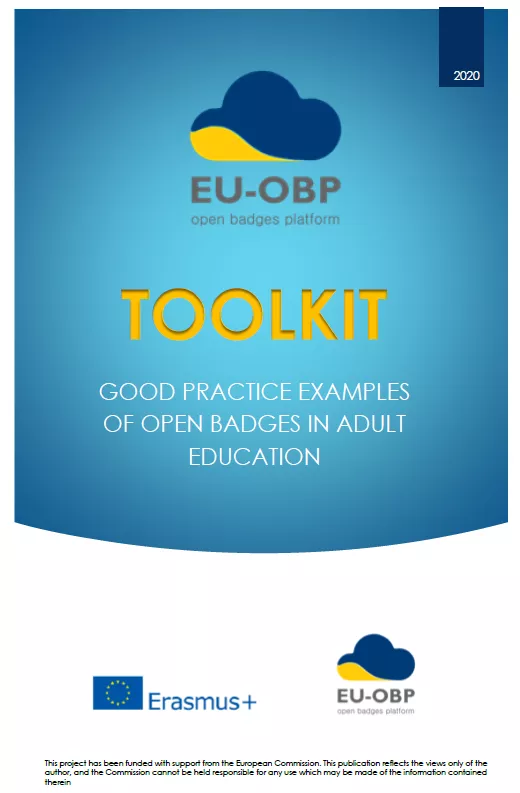EU-OBP project just finalized the Tookit of good practices from EU area
Background
Open badge is a file of the shape of an icon or medal issued to prove skills or achievements of people. The file contains metadata: name of the issuer, the criteria it was issued under, evidence verifying the credential and expiry date. Open badges are available as open standard any organization can use to create, issue and verify digital badges.
Main advantage of open badges is their availability and representational opportunities. They present innovative tools for recognition of achieved soft skills to employers or educators, and could be included into EU-based Europass CV system.
Current actions
Partners have finished the second intellectual output, namely EU-OBP Toolkit of good practices, which brings the selected good practice examples from the field of implementation of open badges in adult education.
Each participating partner therefore performed a desk research to get an overview of good practices which already exist. Under those we counted: organizations that are already issuing open badges in EU area, individual websites with digital badges support and individuals that are using open badges system as part of their curricula or in lifelong learning educational activities.
Toolkit EU-OBP is offering overview of usefulness and advantages of open badges encouraging involvement of new organizations. We want to equip adult education organizations and educators with extensive reading and interactive material (interactive PDF online publication) on good practices of previous successful implementations of open badges recognition system.
We used a common template for collecting data, which offers a uniform and accurate overview of the information obtained.
During the desk research we were able to collect the good examples of open badge use in Scotland, Romania, Bulgaria, The Netherlands, Italy, Slovenia, UK, Cyprus, Latvia, Poland, Spain, France, Sweden, Germany, Austria, Portugal, Lithuania, and Belgium.
The contribution of Open Badges to the recognition of learning is the provision of a unified instrument supporting:
• The recognition of formal (accreditation) as well as informal learning—using Open Badges in formal learning settings can contribute to increasing its acceptance for non-formal learning.
• Learners taking control over the recognition processes—using Open Badges to grow their identity and social reputation.
The project partners have high hopes that the examples presented in the EU-OBP Toolkit are an eloquent indicator of how effectively different organisations implement Open Badges into their education/learning setting. We wanted to give an overall picture of availability of existing organizations and available open badges for adult education and their implementation in whole EU area.
Where can you find EU-OBP READER?
The second result of the project - the EU-OBP Toolkit is now available at our webpage www.eu-obp.eu. Toolkit is available for download as open source.

Next step
Currently partners are preparing a wide selection of newly implemented open badges for adult education. They will cover key competences and soft skills and will be introduced on the web platform until the end of June 2021.
For more detailed information, please visit our webpage www.eu-obp.eu.
Stay tuned, join and follow us on Facebook (@EUOBP)!
Partnership
Applicant Organisation
Partners:
- P2: Technologiko Panepistimio Kyprou, Lemesos (Cyprus)
- P3: Folkuniversitetet Stiftelsen Vid Lunds Universitet, Lund (Sweden)
- P4: Metodo Estudios Consultores SL, Vigo (Spain)
- P5: Volkshochschule Im Landkreis Cham EV, Cham (Germany)
- P6: Accion Laboral Plataforma para la Impl. de Programas de Inclusion Lab, Zaratan (Spain)
- P7: Ljudska Univerza PTUJ, PTUJ (Slovenia)
- P8: Lycee Charles et Adrien DUPUY, Le Puy En Velay (France)
Petja Janžekovič has a Master Degree in Philosophy. He is working in the field of adult education for 13 years. He has expertise in organizing formal and non-formal education, worked also as professor, lecturer, ICT expert, mentor for older adults, conference speaker, coordinator of international study visits and project's leader. His skills include project writing, managing and reporting, media communication, evaluation and dissemination expertize. Since 2008 he is conducting EU and national projects for PUP. Experience with lifelong learning implementaion; has cooperated in more than 15 international projects, including Centre for Lifelong learning Podravje, Grundtvig Learning Partnerships, Grundtvig Multilateral, EU for Citizens programme, and, as 2015, as coordinator and as partner, in Erasmus+ Strategic Partnerships. Since 2008 he is responsible for most of PUP international projects from preparation stage, implementation and project management to the final reporting and content delivery production.




